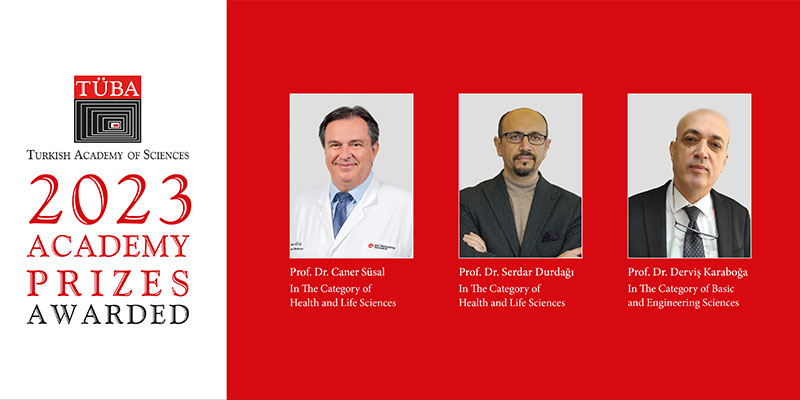2023 Academy Prize Laureates

Within the scope of TÜBA's mission of encouraging and appreciating scientists; a total of three scientists were awarded in two categories: Health and Life Sciences, and Science and Engineering Sciences, for the 2023 "TÜBA International Academy Awards", which is established and open to all scientists in the world.
International TÜBA Academy Awards by the TÜBA Academy Council as a result of the opinions of domestic and foreign referees and the evaluation of the field committees;
In the category of Health and Life Sciences;
2023 TÜBA Academy Award was awarded to Prof. Dr. Caner Süsal, Faculty Member of Koç University Faculty of Medicine, for his outstanding work in organ transplantation with his studies in transplantation of highly sensitized patients, the role of non-HLA immunity and the CD30 molecule in the alloimmune response. He was honored for his contributions to organ transplantation through his work on the induction of insensitivity to the kidney allograft, the identification of markers reflecting the balance between the effector and regulatory components of the alloimmune response, and the preparation of international guidelines.
In the category of Health and Life Sciences;
2023 TÜBA Academy Award was awarded to the Dean of Bahçeşehir University Faculty of Pharmacy Prof. Dr. Serdar Durdağı, for the development of new codes for the creation of ligand-based models with machine learning approaches, was chosen due to his contributions to academia and the pharmaceutical industry through the virtual screening of ultra-large molecule databases, the design of new drug molecules and the hERG1 3D potassium ion channel models (Durdagi/Noskov hERG1 K Models), which are mentioned in the literature with the researchers own name.
In the category of Science and Engineering Sciences;
2023 TÜBA Academy Award was awarded to Prof. Dr. Derviş Karaboğa, faculty member of the Department of Computer Engineering at Erciyes University's Faculty of Engineering and the Director of the Artificial Intelligence Center, his significant contributions to the field of engineering. He particularly distinguished himself by developing the "Artificial Bee Colony algorithm," an optimization algorithm widely used in artificial intelligence applications, thus making important contributions to the world of science and the advancement of technologies. Additionally, his original contributions in applying his research to Energy Efficiency and Health have led to his recognition in these areas as well.
